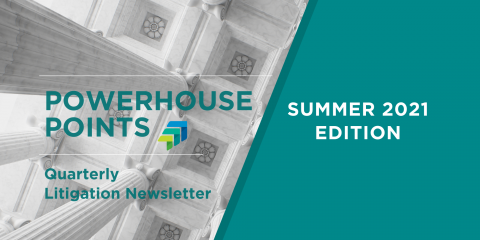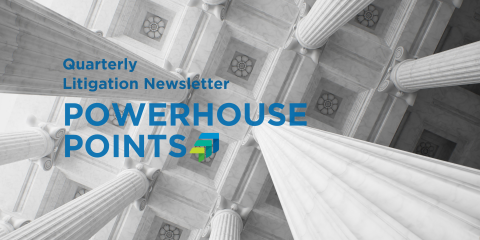COVID-19
At Freeborn, we are witnessing firsthand how this unprecedented global coronavirus (COVID-19) is challenging our firm, our clients and our communities.
At Freeborn, we are witnessing firsthand how this unprecedented global coronavirus (COVID-19) is challenging our firm, our clients and our communities.
As states around the country begin to move into phases of reopening, Freeborn attorneys are continuing to work hard to quickly respond to and advise on the long-term impact of the pandemic on your business, as well as to provide our legal counsel on the business matters for which you rely on our assistance. It remains our commitment to ensure you are prepared for future success.
The firm continues to closely monitor leading health authorities, worldwide economic markets, global and national government and business advisors, agency directives and community impact, all on your behalf. We are committed to maintaining the superior level of service that you expect, and our attorneys and legal support staff are available to answer any questions and provide support on your COVID-19 concerns and matters as you return to your office and navigate this transition period.
We have created this page to serve as a resource for you and your business. Please continue to check back for updates. If any of the below questions have come to mind or are of concern to you or your business, please reach out to any of the key contacts listed.
BANKRUPTCY AND FINANCIAL RESTRUCTURING
Contacts: Shelly A. DeRousse, Elizabeth M. Janczak
Client Alert:
CAPITAL MARKETS OFFERINGS/SECURITIES LAW MATTERS
Contacts: Michael J.W. Rennock, Anthony J. Zeoli
Key Questions:
- May a company (or should it attempt to) conduct a securities offering if already impacted, or likely to be impacted, by, or is in the process of evaluating the impact of, COVID-19?
- Is the actual or likely impact of COVID-19 on a company’s business (including its supply chain), financial condition, liquidity, results of operations and/or prospects considered material to an investment decision for the company’s securities?
- Is (or should there be) a disclosure of the actual or likely impact of COVID-19 on the company and/or its business included in the offering documents and/or securities filings for the particular securities offering? If already distributed, does a company need to update its risk factors in any previously filed/distributed offering documents or securities filings and, if already distributed, what is the proper way to affect such an update?
- Is the company prepared to discuss the actual or likely impact of COVID-19 with potential investors and/or underwriters for the particular securities offering? What diligence should be done in preparation of such discussions?
- Does a forward-looking statement disclaimer adequately protect a company for statements it makes regarding the expected impacts of COVID-19?
- How should a company frame its earnings expectations/projections with respect the potential impact of COVID-19 on their business? Does a company need to update its financial statements/projects in any previously filed/distributed offering documents or securities filings?
- Does a company need to add disclosures to their open offering documents or securities filings related to the potential impact of COVID-19 on its business? on its management team and/or the effectiveness of its succession plan? and/or related to the company’s plan of action (if any) with respect to COVID-19?
CARES ACT
Contacts: Steven M. Hartmann, Meghan E. Tepas, Anthony J. Zeoli
Client Alerts:
- CARES Act Creates New $349 Billion SBA Loan Program to Offer Loans to Eligible Small Businesses
- CARES Act Tax Changes Aim to Provide Businesses Relief
- Copyright Filing Deadlines Further Extended Under CARES Act
- Do I Really “NEED” a Paycheck Protection Program (PPP) Loan and, if I Already Got One, Should I Give it Back?
- Estate Planning Risks and Opportunities in 2020
- FRB Releases Updated FAQ Regarding The “Main Street Lending Program”
- New CARES Act Provides Subsidy for SBA Loan Borrowers
- New PPP Loan Forgiveness Applications, Including “EZ” Form For Eligible Borrowers, Released
- Patent, Trademark and Copyright Filing Deadlines Extended Under CARES Act
- Relief for Aircraft Industry and Auto Manufacturers under Title IV of the CARES Act
- The “Main Street Lending Program”: What It Is and How It Works
- URGENT - New “Paycheck Protection Program Flexibility Act” Significantly Changes PPP Loan Forgiveness Rules
- U.S. Treasury and SBA Offer Additional Guidance on “Paycheck Protection Program” (PPP)
CONTRACTS AND FORCE MAJEURE
Contacts: Tina M. Bird, Meghan E. Tepas
Key Questions:
- Does the COVID-19 outbreak constitute force majeure under your pending agreements?
- Can the COVID-19 outbreak be used as a defense to performance under your pending agreements under an impossibility defense?
- If you are a supplier or contractor and are unable to perform under an agreement due to COVID-19, what should you do and who is responsible to pay for additional costs or delays?
- What impact, if any, does COVID-19 have on a time-is-of-the-essence clause in your agreement(s)?
- If one party to a construction project claims that it cannot perform in accordance with the terms of the agreement because of COVID-19, which party (owner or contractor) is responsible for the loss?
- If litigation is threatened against you and your defense is that you cannot perform in accordance with the terms of the agreement because of COVID-19, what steps should you take?
Client Alerts:
- Commercial Contracts in the Time of Coronavirus: Am I still required to perform?
- Navigating Supply Relationships In The Turbulent World Of Coronavirus Disruption
- Supply Chain Commercial Impracticability in the COVID-19 Crisis
Webinar:
- Commercial Contracts in the Age of COVID-19, Publicity Club of Chicago, presented by Andrew L. Goldstein and Meghan E. Tepas
CORPORATE GOVERNANCE
Contacts: Brian A. Smith, Anthony J. Zeoli
Key Questions:
- How should the company adopt and publicize a policy relating to COVID-19?
- What are the roles of the Board and management in taking control of the corporate response to the COVID-19 outbreak?
- What steps should companies take to ensure that their management team is kept informed and satisfying their fiduciary duties?
- Has company management, with support of a risk management system, identified risks to the business from COVID-19 (in particular the death/incapacity of one or more key persons) and is the management team positioned to provide appropriate oversight of those risks?
- Are any of COVID-19-related risks covered by risk insurance? and/or by business interruption insurance?
- What are best practices for business continuity plans and crisis management procedures (generally and/or specifically with respect to COVID-19)? Is the company’s emergency succession plan up to date in the event one or more of the company’s primary officers contracts COVID-19? Are plans in place for other key persons?
- Does the company have key man insurance in place to cover any/all of its key personnel?
- Does a company have the ability to exclude persons from a physical management/equity holder meeting venues who are showing symptoms of COVID-19? Should companies reschedule physical equity holder/management meetings or switch to a virtual meeting? Is the company set up to conduct required management/equity holder meetings virtually and what other alternatives are there?
Client Alerts:
- CARES Act Creates New $349 Billion SBA Loan Program to Offer Loans to Eligible Small Businesses
- City of Chicago Has Established $100 Million “Chicago Small Business Resiliency Fund” To Offer Assistance Loans to Eligible Local Businesses Affected by Coronavirus (COVID-19)
- City of Chicago Has Established New Emergency Programs to Offer Grants/Loans to Eligible Local Businesses Affected by Coronavirus (COVID-19)
- Illinois Shelter-in-Place Order and Its Impact on Illinois Business Operations
- Illinois Shelter-in-Place Update and the Restore Illinois Plan
- New CARES Act Provides Subsidy for SBA Loan Borrowers
- Paycheck Protection Program (PPP) 2.0 – A Summary of the New and Modified Rules
- SBA Issues New Guidance for PPP Borrowers Looking to Sell Their Business or Engage in Other “Changes of Ownership”
- SBA To Offer Disaster Relief Assistance Loans to Eligible Businesses and Non-Profits Affected by Coronavirus (COVID-19)
- U.S. Treasury and SBA Offer Additional Guidance on “Paycheck Protection Program” (PPP)
EMPLOYMENT
Contacts: Erin M. Franzblau, Steven M. Hartmann, Kathryn T. Lundy, Meghan E. Tepas, Marc B. Zimmerman
Key Questions:
- As an employer, do I have a legal obligation to take steps to protect employees from COVID-19?
- Can I ask my employees if they are experiencing symptoms of COVID-19 or have COVID-19?
- Can I take my employees’ temperatures?
- Am I required to let my employees wear face masks or other personal protective equipment?
- Can I prohibit business travel and personal travel?
- If I do let my employees work from home, is there anything I should consider?
- Am I required to pay my employees who are on leave due to COVID-19?
Client Alerts:
- Considering Layoffs Due to COVID-19? Keep These Things in Mind
- Coronavirus (COVID-19) and the Workplace: Frequently Asked Questions
- COVID-19: What Will Our Workplaces Look Like When the Economy Reopens?
- New Employment Laws in 2019 and 2020 Increase Employer Obligations
- New York State Requires Sick Leave and Job Protection for Employees Subject to Quarantine or Isolation due to COVID-19 Crisis
- President Signs COVID-19 Paid Leave Bill into Law
- U.S. Department of Labor Issues Additional Guidance for Compliance with the Families First Coronavirus Response Act
ENVIRONMENT AND ENERGY
Contacts: Philip L. Comella, Ryan G. Rudich
Client Alerts:
- After a Hot Start to 2020, COVID-19 Creates RIN Market Uncertainty for Landfill Gas
- Better to Beg For Forgiveness Than to Ask Permission?: A Survey of COVID-19 Environmental Enforcement Policies
- How “Stay at Home” Orders are Impacting the Waste Industry Across the Country
- OSHA Recommendations for Municipal Solid Waste, Medical Waste, and Wastewater with Possible COVID-19 Contamination
- Update: Update: How “Stay at Home” Orders are Impacting the Waste Industry Across the Country
- U.S. Environmental Protection Agency Set to Scale Back Enforcement Actions During COVID-19
ESTATE PLANNING
Contacts: William E. Russell, Michael D. Whitty
Client Alerts:
- Estate Planning Affected by Recent Events: Planning for Predictable Estate Tax Increases; Tax Repercussions of COVID-19-Driven Workplace Trends: Planning for Section 529 Accounts After COVID-19 Effects on Higher Education
- Estate Planning Affected by Recent Events: The SECURE Act, the New Illinois Uniform Trust Code, and the Coronavirus
- Estate Planning Continues to be Affected by Recent Events: Low Valuations, Lower Interest Rates, Great Opportunities, and the Great GRAT
GLOBAL FRAUD, INVESTIGATIONS AND ASSET RECOVERY
Contact: Neal Levin
Client Alert:
INSURANCE
Contacts: Jessica K. Alley, Robert M. Baratta Jr., Bruce M. Engel, Patrick Frye, Lawrence P. Ingram, John M. O'Bryan
Key Questions:
- What coverage is available under business insurance policies for loss associated with COVID-19?
- If businesses are forced to close, is their coverage for loss resulting from this business interruption?
- Is coverage available for disruptions to supply chains, event cancellation, property contamination, etc.?
- What coverage is available for management missteps in responding to the risks presented by COVID-19?
Client Alerts:
- Class Actions Against Property Insurers in the Wake of COVID-19
- Collaboration Among Insurers on Responses to COVID-19
- Constitutional Questions Presented by Proposed State Legislation Requiring Retroactive Business Interruption Insurance Coverage for COVID-19 Related Claims
- COVID-19 Claims: Single or Multiple Occurrences?
- COVID-19 Insurance Update: Coverage for Loss of Income Following Government Closures of Businesses
- COVID-19 Insurance Update: Five Early Court Decisions on Insureds’ Claims to Business Interruption Coverage for Their COVID-19 Losses
- COVID-19 Insurance Update: More Court Decisions on Insureds’ Claims Against Their Property Insurance Policies for Coverage of Their COVID-19 Losses
- COVID-19 Insurance Update: Possible Government Solutions to the Debates over Insurance Coverage for Business Interruption Losses
- COVID-19 Insurance Update: Significant Differences Among Proposed Laws to Require Property Insurers to Pay COVID-19 Business Interruption Claims
- Effect of Illinois Shelter-in-Place Order on the Insurance Industry
- Insurance Coverage for COVID-19 Loss and Liabilities
- Trends in COVID-19 Business Interruption Coverage Actions
INTELLECTUAL PROPERTY
Contact: Andrew L. Goldstein
Client Alerts:
- Copyright Filing Deadlines Further Extended Under CARES Act
- Livestreaming Without a License: How to Avoid Copyright Infringement Risks
- Patent, Trademark and Copyright Filing Deadlines Extended Under CARES Act
- Protecting Intellectual Property During COVID-19
- Sweepstakes Contests and Promotions and COVID-19
- United States Patent and Trademark Office Expedites COVID-Related Trademark Applications
- USPTO and USCO Continue Adapting to COVID-19
MERGERS AND ACQUISITIONS
Contact: Brian A. Smith
Key Questions:
For Sellers:
- How is the buyer financing the acquisition? Does the buyer need outside equity investment, which may be affected by turbulence in the stock market and illiquidity of other assets? Does the buyer need debt financing, which may be affected by decreased bank availability?
- Where is buyer located? Will travel restrictions affect the buyer’s ability to perform typical in-person diligence and management meetings?
- If seller is rolling over any equity, or providing seller financing, or receiving an earnout or other post-closing payments, will the coronavirus impact buyer’s business, liquidity, or ability to fund payments post-closing?
- Draft “material adverse change” / “material adverse effect” conditions and definitions carefully, considering potential coronavirus scenarios.
- Consider how coronavirus impacts representations and warranties, such as undisclosed liabilities relating to the virus, whether force majeure provisions under material contracts have been triggered, and relationships with customers and suppliers.
- Consider pre-closing covenants that might affect the seller’s ability to operate the business and to respond to the ever-changing virus issues.
- Consider the impact of delays in obtaining any necessary regulatory approvals or consents as a result of virus related issues.
For Buyers:
- How should due diligence be expanded to examine coronavirus issues? Consider suppliers, customers, employees, liquidity, contracts, and other issues.
- Will buyer’s financing be affected by virus issues, financial market turbulence, and the effects of the economic downturn? Are there any penalties or buyer defaults in the purchase agreement if buyer fails to obtain financing and close the transaction?
- In due diligence, review force majeure provisions in material contracts, and consider the effects of potential coronavirus scenarios.
- Draft “material adverse change” / “material adverse effect” conditions and definitions carefully, considering potential coronavirus scenarios.
- Should additional representations be added to address the virus? Consider representations about force majeure provisions in the material contracts representations and additional representations about customers, supply chain and employees.
PRIVACY AND INFORMATION SECURITY
Contacts: Andrew L. Goldstein
Key Questions:
- Do the US privacy laws prohibit mass tracking of peoples’ movements or contacts using smartphone data similar to GDPR and if a tracking-based system is deployed, what data protection levels are necessary to keep the information secure?
- What are the workplace health and safety impacts of US privacy laws, such as the impact on required workplace health, travel, and contacts questionnaires and travel restrictions or notification requirements?
- Should businesses be creating or reassessing their business continuity plans to include company level operational impact of COVID-19?
- Should businesses publish their own COVID-19 statements indicating their intentions to adhere to all regulations and guidelines from governmental authorities related to COVID-19 containment?
- Do business’ terms of service contain force majeure or Act of God provisions excusing performance and limiting liability for their failure to perform due to circumstances beyond their control?
- Have you cautioned your employees about being careful not to respond to emails regarding coronavirus that may consist of phishing attempts or scams?
- Can you prevent your employees from posting to social media regarding the status of coronavirus with your company or the steps your company is taking to address it?
- Do you have appropriate business associate agreements in place with your vendors who have access to protected employee health information?
- If your employee has told you that the employee has coronavirus, coronavirus symptoms, or is sick, who can/should you tell?
- Has the health information about an employee been requested by a public health authority or a foreign government agency that is acting in collaboration with the public health authority?
- Is the health information about an employee being disclosed to a public health authority, such as the CDC or a state or local health department, which is authorized by law to collect or receive such information for the purpose of preventing or controlling disease, injury or disability?
- Can you disclose employee health information to the employee’s family members, relatives, friends, or other persons identified by the patient as involved in the patient’s care?
- Can you share employee health information to identify, locate, and notify family members, guardians, or anyone else responsible for the employee’s care, of the employee’s location, general condition, or death?
Client Alerts:
- COVID-19 Contact Tracing: Can it Co-Exist with Personal Privacy?
- Five Cyber Issues Companies Should Consider in the Midst of COVID-19
REAL ESTATE
Contacts: Tina M. Bird, James S. Gray, Chad J. Richman, Richard J. Traub
Key Questions:
- Does my tenant need to continue to pay rent?
- Does my landlord need to continue to provide access to my space and perform essential services?
- Will title companies continue to facilitate transactions and issue title policies during quarantine periods?
- Are Time of the Essence closings automatically postponed?
- Are deadlines in contracts of sale (e.g., due diligence) or leases (e.g., commencement dates) automatically suspended/extended?
- Is completion deadline in a construction contract now obsolete?
- What impact will Federal interest rate decisions have on my loans?
- Will the coronavirus and its effects be interpreted as falling within the force majeure and material adverse event language within each document, or if no such language is present will it be implied?
- Will coronavirus-safe operations sanitizing by borrowers/owners/tenants be implied in?
- Will insurance requirements change?
- Will continuous conduct of business and co-tenancy type requirements be suspended in leases?
- Instead of default/no default, will certain consequences of what is otherwise a default caused by coronavirus be subject to reasonable accommodations by both parties?
- Will the closure of Recorder of Deeds’ offices as a result of COVID-19 impact the ability to close real estate transactions, record mechanic’s liens and the like?
REINSURANCE
Contacts: Joseph T. McCullough IV, Sean T. Keely, Thomas F. Bush, John M. O'Bryan
Key Questions:
- Where are the potential COVID-19 exposures in your company’s book of business – life and health, annuity, aviation, property, workers compensation, casualty?
- Which industries may present the greatest COVID-19 exposures – such as health care, hotel and hospitality, travel, energy, supply chain services?
- What are the potential aggregation scenarios? Does your reinsurance treaty language permit accumulation of claims and under what circumstances? How does the developing understanding of the nature of the novel coronavirus and exposure to it potentially support accumulation?
- What exclusions are contained in your reinsurance contracts and how might they be applicable to COVID-19 – such as exclusions for pandemics, pollutants or bacteria?
- Do your reinsurance contracts contain a “follow the fortunes” or “follow the settlements” provision and, if so, how might the provision apply in a circumstance where an underlying claim is paid following public and governmental pressure on insurers? Or following legislation mandating coverage of such claims despite a cedent’s coverage defenses?
- Will arbitration panels be receptive to defenses based on ex gratia payments of claims?
- Do your reinsurance contracts contain clauses providing a right for the reinsurer to associate in the handling of reinsured claims or even to control claims? If so, in which situations should reinsurers exercise such rights when confronting potential COVID-19 exposures and how should cedents respond to or even invite such engagement by reinsurers?
Client Alert:
- COVID-19 Claims: Single or Multiple Occurrences?
- Reinsurance Implications of Politically Expanded COVID-19 Coverage
RETURN TO WORKPLACE
Contacts: Mark R. Goodman, Erin McAdams Franzblau, Kathryn T. Lundy, John T. Shapiro, Meghan E. Tepas
Webinar:
- Getting Back to Business: Safely, Legally, and Effectively (Recording Available)
Resource:
SUPPLY CHAIN
Contacts: Matthew J. O'Hara, John T. Shapiro
Key Questions:
- Are force majeure clauses enforceable?
- What are the defenses to contract performance without force majeure clauses?
- What is the scope of force majeure clauses?
- Can you assist in the drafting of force majeure clauses?
- What is the impact of take-or-pay or non-cancellation clauses on excusal of contract performance?
- What is the impact of price-adjustment contract formulas on excusal of contract performance?
- What circumstances constitute impracticability of performance under UCC Article 2?
- When do the contract doctrines of frustration of purpose or impossibility of performance apply?
- What are buyers’ remedies for non-performance if force majeure or impracticability applies? What are sellers’ remedies?
Client Alert:
- Navigating Supply Relationships In The Turbulent World Of Coronavirus Disruption
- Supply Chain Commercial Impracticability in the COVID-19 Crisis
TAX
Contacts: Brian A. Smith
Key Questions:
- Tax laws and regulations may change rapidly due to the COVID-19 crisis. Does the company have a plan in place to keep informed of these changes?
- Is there any impact on the company’s tax filing and payment deadlines? The April 15 deadline for certain federal income tax payments has been extended to July 15 (details here). In addition, some states and municipalities have extended deadlines for filing tax returns and/or paying taxes.
- What are the impacts on state tax nexus in an environment of reduced travel and an increase in employees working from home?
- How will travel restrictions affect tax residency requirements?
- What are the tax consequences of payments and costs arising from cancellations due to COVID-19, such as contract termination fees?
- Does the company’s tax planning and estimated tax liability for 2020 need to be reevaluated in light of the business disruptions resulting from COVID-19?
- For a company with locations in multiple countries, does international tax planning need to be reevaluated as a result of moving cash to locations economically affected by COVID-19?
Client Alert:
Attorneys
Partner
Partner
Partner
Partner
Partner
Senior Counsel
Partner and General Counsel
Partner
Partner
Partner
Partner
Partner
Partner
Partner
Partner
Partner












































